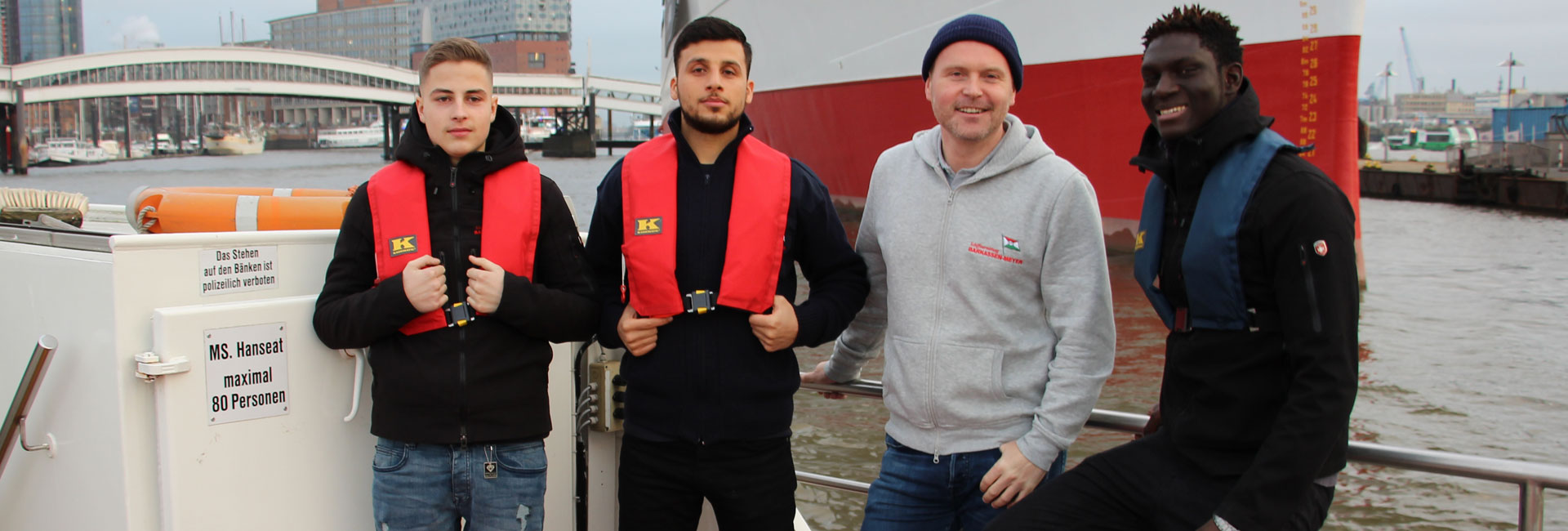The new world of port occupations
Digitalization is changing many jobs. With their PortSkill 4.0 project, ma-co and its partners aim to discover how this affects those in the port ....

Water is their element and they love the port. Ousman 23, Rafi 25 and Paul 16 are three of five trainees with Barkassen-Meyer at St Pauli landing stages for the job of port skipper. “I have always wanted to work on the water, and I am so happy to have the chance of becoming a port skipper,” says Rafi, who has just completed his first year of training. The job is extremely varied and he enjoys being in contact with people. Ousman, in his third year, and Paul in his first, also wanted to be dealing with people.
“It is exciting to discover why so many people want to take holidays in Hamburg and where they come from. I also enjoy telling them about my home town and the port,” says Paul, who was initially sceptical about whether this was the career for him. Ousman had worked as a fisherman in his Gambia homeland in West Africa. It was obvious to him that he wanted to take to the water again in Hamburg. Since he was not at first permitted to leave the city, he looked for an alternative to being a fisherman.
A career as a port skipper is very demanding. As soon as the trainees have completed their course, they are permitted to take the helm of vessels on passenger and cargo services in deepsea and inland ports. There’s plenty to be done on board. The future port skippers look after not just the walkie-talkie and the navigating instruments but also - as with Barkassen-Meyer that operates in the tourism business - the guests. “We have to keep the vessels shipshape and clear the decks when we start work,” explains Paul. He uses the German word ‘Wolke’, standing for water, oil, air, fuel and electricity, to remind him of jobs still to be done.
“We learn how the engine and the pumps function,” explains Rafi. When necessary, they must be able to carry out minor repairs themselves. The trainees learn craft skills in Meyer’s own workshop. “We are all-rounders and sometimes need to get our hands dirty,” confirms Ousmann. Apart from scratching off marine coating and rust, berthing and casting off, like selling tickets, are among their tasks. Making fast the vessel also needs to be learned. “We need to know how to handle the lines,” he adds.
The trainees also acquire extensive theoretical knowledge, visiting the trade school to do so for three weeks in every ten. “We have to attend there and join in. We do not recover anything we may miss” says Paul. There’s a lot to be learned. Each theory module ends with a test. Apart from safety, health and environmental protection, the syllabus also includes law, English and maths. The subjects also include boat terms, navigation, port history and waterway layout. “Like taxi drivers, we must know the names of all the waterways and quay facilities,” says Ousman. The apprentice port skippers also need to know their traffic rules, signs, what lights mean, and something of currents, winds and tides. “Because of tidal surge, for example, Warehouse City, is not always accessible,” Rafi points out. How to proceed following ship accidents or breaks in operation also belongs in the syllabus. “Skippers can be responsible for up to 300 people,” says Hubert Neubacher, owner of Barkassen Meyer. Future port skippers must provide First Aid and be capable of handling fire extinguishers, also be able to produce rescue swimmer and passenger transport licences. Before starting training, they therefore have a health check-up. Training lasts three years, a school-leaving certificate suffices as qualification, although GCSE-level is desirable.
That this trio should have been given a vocational training place results from their boss’s confidence. “We urgently need a new generation for launches, ferries, passenger vessels and tugs. Yet I also wanted to signal that we believe in the future,” explains Neubacher, whose ten craft were laid up in the port for months during lockdown. “We are proud and grateful to be able to train for an occupation,” agree all three. Rafi is already thinking about the next step: “With a really good grade in the final exam, we could go on to do nautical studies.“